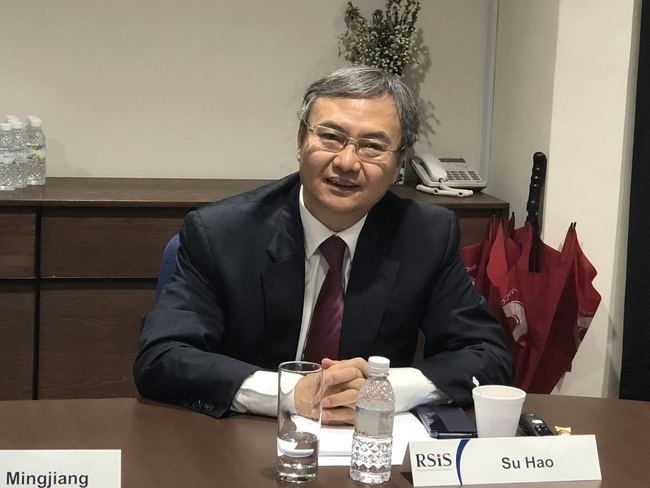 |
|
Su Hao, Professor of China Foreign Affairs University
|
Increased interdependence of both sides minimizes possibility of serious clashes
Professor Su Hao of China Foreign Affairs University rated US-China relations at the moment as “the worst they’ve been since diplomatic relations were established.” An international relations expert at the university – which is affiliated with the Chinese Foreign Ministry and trains experts in the field of foreign affairs – Su predicted that Beijing is capable of making numerous concessions, but argued that Washington’s demands have been excessive. At the same time, he said the two sides’ increased interdependence means they will not rush into any serious clashes. “Whereas China-US relations in the past followed an upward curve of gradual development, strengthening, and fusion, we’re now seeing the opposite downward curve,” Su said of the two sides’ relationship as it marks its 40th anniversary. According to Su, the past four decades saw the US helping China in an effort to expand its own economy, while the less-powerful China used the US to develop its own economy. Cooperation with China also played a part in the US curbing the Soviet Union during the Cold War and pursuing strategic goals such as a response to terrorism after the Cold War ended. But a conflict erupted between the two sides amid shifts to the global order in the wake of World War II, he concluded. “These days, you can’t simply say that international relations are driven by the US and other Western countries. The US’ influence has waned as the developing countries have made advancements, as we seen with the BRICS nations (Brazil, Russia, India, China, and South Korea) and the G20,” he explained. “The US has redefined China as a ‘rival’ now that it has emerged as the world’s second-ranked economy with major influence,” Su said. “The ‘rebalancing’ policies of the Barack Obama administration also targeted China, so it probably would have been more of the same had Hillary Clinton been elected [President],” he added. State systems and economic structures can’t be changed to meet US demands In terms of the two sides’ trade war, Su predicted they may be able to reach a consensus, but added that structural contradictions could remain in place due to the US’s excessive demands. “They may be able to achieve a temporary agreement through 90 days of negotiation, but they won’t be able to solve all of the issues. Some of the US’ demands are also too unreasonable for China to agree to all of that,” he explained. “State systems and economic structures are the results of a country’s characteristics and political decisions. Those can’t be changed to meet US demands,” he argued. Su predicted that even if the conflicts do drag on, they will not reach a level on par with the Cold War between the US and Soviet Union. The biggest reason, he argued, is that China-US relations “aren’t a matter of determining the superior of two different societal systems, nor are there blocs that China and the US individually represent.” “Modern international relations today are such that the whole world is integrated through unavoidable economic globalization,” he said. “It’s an interdependence, an ‘I’m part of you and you’re part of me’ situation, and that goes for China and the US as well.” As an example of profound interdependence, Su noted that China’s top trade partners include US allies South Korea, Japan, and Germany. China’s concern that US Korean Peninsula policy designed to curb Beijing’’s influence The US views China as leverage over North Korea, while China shares the US’ goals in terms of North Korea’s denuclearization. But China has also expressed fears that US’ unilateral approach presents a stumbling block and that Washington is approaching its Korean Peninsula policy within a framework of reining in China’s influence. “Beijing is worried that the US will look up the Korean Peninsula as a platform for a strategy of curbing China,” Su said. “A rare current of peace has emerged on the [Korean] peninsula, but the progress in inter-Korean relations could end up halted up if things proceed according to the US’ aims of maintaining strategic and military influence in Northeast Asia,” he predicted. Su argued that mutual respect is necessary to resolve the different conflicts. “China and the US need to share responsibility and play positive roles for world peace and development. Unilateralism will not do,” he said. “They will need to assume joint responsibility for peace and stability in the Asia-Pacific region, including the Korean Peninsula.” By Kim Oi-hyun, Beijing correspondent Please direct comments or questions to [english@hani.co.kr]






